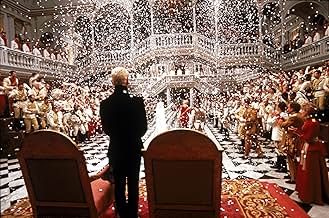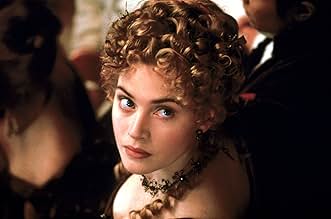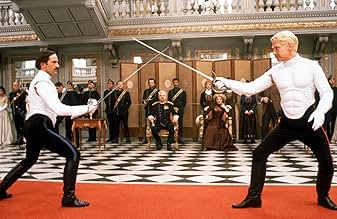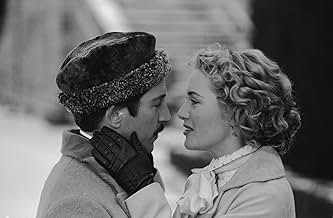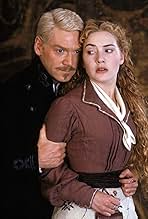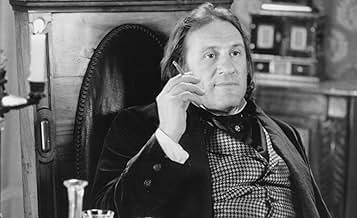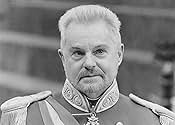IMDb-BEWERTUNG
7,7/10
41.225
IHRE BEWERTUNG
Hamlet, Prinz von Dänemark, kehrt nach Hause zurück. Sein Vater wurde ermordet und seine Mutter heiratet den Mörder, seinen Onkel. In der Zwischenzeit braut sich ein Krieg zusammen.Hamlet, Prinz von Dänemark, kehrt nach Hause zurück. Sein Vater wurde ermordet und seine Mutter heiratet den Mörder, seinen Onkel. In der Zwischenzeit braut sich ein Krieg zusammen.Hamlet, Prinz von Dänemark, kehrt nach Hause zurück. Sein Vater wurde ermordet und seine Mutter heiratet den Mörder, seinen Onkel. In der Zwischenzeit braut sich ein Krieg zusammen.
- Regie
- Drehbuch
- Hauptbesetzung
- Für 4 Oscars nominiert
- 9 Gewinne & 25 Nominierungen insgesamt
Rizz Abbasi
- Attendant to Claudius
- (as Riz Abbasi)
Empfohlene Bewertungen
I must say that, looking at Hamlet from the perspective of a student, Brannagh's version of Hamlet is by far the best. His dedication to stay true to the original text should be applauded. It helps the play come to life on screen, and makes it easier for people holding the text while watching, as we did while studying it, to follow and analyze the text.
One of the things I have heard criticized many times is the casting of major Hollywood names in the play. I find that this helps viewers recognize the characters easier, as opposed to having actors that all look and sound the same that aid in the confusion normally associated with Shakespeare.
Also, his flashbacks help to clear up many ambiguities in the text. Such as how far the relationship between Hamlet and Ophelia really went and why Fortinbras just happened to be at the castle at the end. All in all, not only does this version contain some brilliant performances by actors both familiar and not familiar with Shakespeare. It is presented in a way that one does not have to be an English Literature Ph.D to understand and enjoy it.
One of the things I have heard criticized many times is the casting of major Hollywood names in the play. I find that this helps viewers recognize the characters easier, as opposed to having actors that all look and sound the same that aid in the confusion normally associated with Shakespeare.
Also, his flashbacks help to clear up many ambiguities in the text. Such as how far the relationship between Hamlet and Ophelia really went and why Fortinbras just happened to be at the castle at the end. All in all, not only does this version contain some brilliant performances by actors both familiar and not familiar with Shakespeare. It is presented in a way that one does not have to be an English Literature Ph.D to understand and enjoy it.
As a play, Hamlet is an anchor of civilization, and even moderately successful films are worth seeing. But in making the translation to film, the artist has two challenges.
The first concerns the work as drama. This is Shakespeare's most ambitious vision, one he tinkered with and enlarged both conceptually and literally. The purest choice, the only choice which can encompass the full weave of the work, is to include everything -- and that's what Branagh has done. Consequently, this work has extra dimensions of life. In doing so, he's included some nice touches:
--gone are superficial hints of mother-lust in the closet scene. These were never in the text.
--we are reminded that Hamlet's initial and sustaining anger is because his uncle jumped into the line of succession
--we see the hints that Hamlet was a student of Bruno in the book on witchcraft he consults after seeing the ghost. Also his book on `matters' (often thought to be Bruno's) is actually given to Ophelia. Nice. Shows deep research.
--Polonius is treated humanely, as more than a dottering fool. This makes Ophelia's loss (and earlier obedience) believable.
The second challenge is cinematic. The play was written for sparse settings; it translates naturally to audio tape and unnaturally to film. So the filmmaker has an open palette. Branagh makes some interesting choices. Many work extremely well, in particular the mirrors in the `to be' and Ophelia sequence. Others are strange:
--he introduces recognizable actors in secondary roles to jar us into the realization that this is a play. (One of these is really funny. How do you portray an actor among actors playing non-actors. Well, you get a noticeably BAD actor. I wonder if Heston knows he'll be goofed on for this for many decades as this film outlives his sandled perorations.)
--he introduces some almost satirical film reflections: a cheesy ghost, an Errol Flynn chandelier swing...
--he provides visual overlays for some of the images implied in the text: Hamlet's lovemaking, considerations in Norway, reflections of the players. This ruins a few of the important ambiguities but we do have a wealth to spend after all.
--in perhaps the worst loss of ambiguity, he makes Fortinbras an invader. This is done only to allow for some cinematic sweep at the end. Okay, I'll reluctantly buy it since the alternative is extended mugging in the death scenes.
I think Branagh and collaborators meet the first challenge nearly perfectly. As to the second challenge, this is our very best film version, in part because of extending the US tradition of playing the characters as real people (versus the UK tradition of characters as speechifiers). So far as the cinematic challenge, there are some great, really great visions here, but there are also some big cinematic misses which keeps this far from perfect. Until Greenaway attempts it, this is the best film Hamlet we have, and that simply makes it one of the best, most rewarding films ever. I'll bet Branagh tries again before he dies.
The first concerns the work as drama. This is Shakespeare's most ambitious vision, one he tinkered with and enlarged both conceptually and literally. The purest choice, the only choice which can encompass the full weave of the work, is to include everything -- and that's what Branagh has done. Consequently, this work has extra dimensions of life. In doing so, he's included some nice touches:
--gone are superficial hints of mother-lust in the closet scene. These were never in the text.
--we are reminded that Hamlet's initial and sustaining anger is because his uncle jumped into the line of succession
--we see the hints that Hamlet was a student of Bruno in the book on witchcraft he consults after seeing the ghost. Also his book on `matters' (often thought to be Bruno's) is actually given to Ophelia. Nice. Shows deep research.
--Polonius is treated humanely, as more than a dottering fool. This makes Ophelia's loss (and earlier obedience) believable.
The second challenge is cinematic. The play was written for sparse settings; it translates naturally to audio tape and unnaturally to film. So the filmmaker has an open palette. Branagh makes some interesting choices. Many work extremely well, in particular the mirrors in the `to be' and Ophelia sequence. Others are strange:
--he introduces recognizable actors in secondary roles to jar us into the realization that this is a play. (One of these is really funny. How do you portray an actor among actors playing non-actors. Well, you get a noticeably BAD actor. I wonder if Heston knows he'll be goofed on for this for many decades as this film outlives his sandled perorations.)
--he introduces some almost satirical film reflections: a cheesy ghost, an Errol Flynn chandelier swing...
--he provides visual overlays for some of the images implied in the text: Hamlet's lovemaking, considerations in Norway, reflections of the players. This ruins a few of the important ambiguities but we do have a wealth to spend after all.
--in perhaps the worst loss of ambiguity, he makes Fortinbras an invader. This is done only to allow for some cinematic sweep at the end. Okay, I'll reluctantly buy it since the alternative is extended mugging in the death scenes.
I think Branagh and collaborators meet the first challenge nearly perfectly. As to the second challenge, this is our very best film version, in part because of extending the US tradition of playing the characters as real people (versus the UK tradition of characters as speechifiers). So far as the cinematic challenge, there are some great, really great visions here, but there are also some big cinematic misses which keeps this far from perfect. Until Greenaway attempts it, this is the best film Hamlet we have, and that simply makes it one of the best, most rewarding films ever. I'll bet Branagh tries again before he dies.
I enjoyed this film immensely when it came out, going to it five times while it was still in theatres. A much better way to spend an evening than watching the retread scifi thriller material out at the time.
I have to admit though that after seeing it again a few times on video it doesn't have the same attraction for me that it originally did. As film, it's solid. The settings are wonderful, and I admire the desire to produce the entire play unedited.
I don't enjoy the acting as much as I first did. In the case of Branagh, that may be merely a matter of personal taste. I would prefer a less garrulous Hamlet. Obviously, since all actors of Hamlet are working from the same script, unless edited, this is dependent entirely on the manner in which they portray the character. I find Branagh's performance a bit cloying, and far too over the top in some cases.
In addition, some of the cameos are distracting. Heston and Crystal I enjoy, but Williams, and particularly Lemmon, are annoying. The others, Attenborough et al, are fine.
While I can't give Hamlet a whole-hearted recommendation, I have to say that it far surpasses the trite commercialism of all the new "greatest films of all time" which have come out over the last few years. That's a phrase being used far too often now, revealing a lack of familiarity with the great films of the past. In that sense, I admire Mr. Branagh's desire to bring great drama to the screen, and hope that he meets with continued success in the future.
I have to admit though that after seeing it again a few times on video it doesn't have the same attraction for me that it originally did. As film, it's solid. The settings are wonderful, and I admire the desire to produce the entire play unedited.
I don't enjoy the acting as much as I first did. In the case of Branagh, that may be merely a matter of personal taste. I would prefer a less garrulous Hamlet. Obviously, since all actors of Hamlet are working from the same script, unless edited, this is dependent entirely on the manner in which they portray the character. I find Branagh's performance a bit cloying, and far too over the top in some cases.
In addition, some of the cameos are distracting. Heston and Crystal I enjoy, but Williams, and particularly Lemmon, are annoying. The others, Attenborough et al, are fine.
While I can't give Hamlet a whole-hearted recommendation, I have to say that it far surpasses the trite commercialism of all the new "greatest films of all time" which have come out over the last few years. That's a phrase being used far too often now, revealing a lack of familiarity with the great films of the past. In that sense, I admire Mr. Branagh's desire to bring great drama to the screen, and hope that he meets with continued success in the future.
First, what I didn't like. The acting was not really up to the Hamlet standard. Branagh was really over-the-top, doing a lot of yelling mostly. In my opinion, those actors who were not big-name celebrities generally did a better job; though I would except Billy Crystal and Robin Williams. (And Charlton Heston, too, but I wasn't sure if he was playing at being a hack.) A lot of the ambiguities in the play were clearly resolved one way in the flashbacks.
What I think speaks very much in this play's favor is that it is accessible. Shakespeare is hard to understand for the vast majority of people nowadays; many people are not even inclined to try, because of its reputation as Serious Literature and its archaic English. If they see this film they will understand clearly at least one man's interpretation of the play. They will be seeing it more as Shakespeare's audiences saw it: a play with sword fights and battles, and mighty kings and nobles, murder and incest and evil schemes and ghosts--and great art, if one cares to look for it, but in Shakespeare's day most didn't, any more than most people do now. Branagh's overacting, and his forcing of his interpretation of the story on the viewer, may detract from Shakespeare's art somewhat, but it is better that modern audiences get a piece of it, rather than nothing.
I've got to say one more thing though. Some people are complaining that "it's set in the 19th century and that wasn't Shakespeare's time". Well, in Shakespeare's time their costume and scenery was that of their own day for all of their plays. Shakespeare may have SAID it's in the days of ancient Rome or medieval Denmark or whatever, but he didn't dress his characters up like they were, he used the costumes of his own time. For the same reason his plays are full of anachronisms. For example, in King John the English and French have cannons--in Robin Hood's day. In Julius Caesar they talk of chimneys, which wouldn't be invented for another thousand years, and in Henry IV they talk about Machiavelli, who wasn't even born yet then. So I think this objection is silly--you might as well complain that the play isn't in Danish (after all they live in Denmark don't they?).
What I think speaks very much in this play's favor is that it is accessible. Shakespeare is hard to understand for the vast majority of people nowadays; many people are not even inclined to try, because of its reputation as Serious Literature and its archaic English. If they see this film they will understand clearly at least one man's interpretation of the play. They will be seeing it more as Shakespeare's audiences saw it: a play with sword fights and battles, and mighty kings and nobles, murder and incest and evil schemes and ghosts--and great art, if one cares to look for it, but in Shakespeare's day most didn't, any more than most people do now. Branagh's overacting, and his forcing of his interpretation of the story on the viewer, may detract from Shakespeare's art somewhat, but it is better that modern audiences get a piece of it, rather than nothing.
I've got to say one more thing though. Some people are complaining that "it's set in the 19th century and that wasn't Shakespeare's time". Well, in Shakespeare's time their costume and scenery was that of their own day for all of their plays. Shakespeare may have SAID it's in the days of ancient Rome or medieval Denmark or whatever, but he didn't dress his characters up like they were, he used the costumes of his own time. For the same reason his plays are full of anachronisms. For example, in King John the English and French have cannons--in Robin Hood's day. In Julius Caesar they talk of chimneys, which wouldn't be invented for another thousand years, and in Henry IV they talk about Machiavelli, who wasn't even born yet then. So I think this objection is silly--you might as well complain that the play isn't in Danish (after all they live in Denmark don't they?).
Olivier, Kosentsev, Richardson, Coranado, Zefferelli, and Almerayeda have all directed Hamlet but Branagh's the only one who got it right.
This is the only film of "Hamlet" that contains the full four hours of William Shakespeare's masterpiece and gives a unique feel to the whole story.
Not many directors could pull this off without boring their audience but Branagh's skillful use of bravora film style and stunt casting allows people to see the importance of the scenes that are usually cut out.
Examples of this include Gerarde Depardue as Ranyaldo whos entire purpose in the film was to simply say "yes my lord" as Polonius asks him to spy on Leartes. This also included Billy Crystal as the grave digger, Robin Williams as Osric, Jack Lemmon as Marcellous, and Charlton Heston as the actor.
Branagh's performance of the Act 4 scene 4 soliloquy (Which again is usually cut out) is nothing short of c cinematic marvel as the camera slowly pulls back as the intensity grows. It is a scene that literally made me want to jump out of my chair and start applauding.
Branagh is the only film maker that understood the importance of every scene in this film and knew how to convey that importance to the general audience.
This is a must see for everyone who enjoy's good story telling, brilliant acting,and incredible direction. All of these part of William Shakespeares greatest triumph.
This is the only film of "Hamlet" that contains the full four hours of William Shakespeare's masterpiece and gives a unique feel to the whole story.
Not many directors could pull this off without boring their audience but Branagh's skillful use of bravora film style and stunt casting allows people to see the importance of the scenes that are usually cut out.
Examples of this include Gerarde Depardue as Ranyaldo whos entire purpose in the film was to simply say "yes my lord" as Polonius asks him to spy on Leartes. This also included Billy Crystal as the grave digger, Robin Williams as Osric, Jack Lemmon as Marcellous, and Charlton Heston as the actor.
Branagh's performance of the Act 4 scene 4 soliloquy (Which again is usually cut out) is nothing short of c cinematic marvel as the camera slowly pulls back as the intensity grows. It is a scene that literally made me want to jump out of my chair and start applauding.
Branagh is the only film maker that understood the importance of every scene in this film and knew how to convey that importance to the general audience.
This is a must see for everyone who enjoy's good story telling, brilliant acting,and incredible direction. All of these part of William Shakespeares greatest triumph.
Wusstest du schon
- WissenswertesRobin Williams and Billy Crystal were not allowed to be on the set at the same time during filming, for fear they would crack up the cast and crew, and cause major production delays.
- PatzerIn the very long shot along the length of the throne room, the cameras are visible in the mirrors.
- Alternative VersionenTwo versions should have been theatrically released at the same time: a complete 242-minutes director's cut shown only in selected venues (large key cities) and a shorter, wide-release version that ran about two-and-a-half hours. After some critical backlash, Castle Rock decided to release the complete 4 hours everywhere in the US and use the shorter version for some overseas territories.
- SoundtracksIn Pace
Music by Patrick Doyle
Performed by Plácido Domingo
Text for The Book of Wisdom
Text researched and adapted by Russell Jackson
Recorded at Studio 33, Hamburg, Germany
Engineered by Ambrogio Crotte and Luis Rodriguez
Original soundtrack available on Sony Classical Records
Top-Auswahl
Melde dich zum Bewerten an und greife auf die Watchlist für personalisierte Empfehlungen zu.
Details
- Erscheinungsdatum
- Herkunftsländer
- Sprache
- Auch bekannt als
- William Shakespeare's Hamlet
- Drehorte
- Produktionsfirmen
- Weitere beteiligte Unternehmen bei IMDbPro anzeigen
Box Office
- Budget
- 18.000.000 $ (geschätzt)
- Bruttoertrag in den USA und Kanada
- 4.708.156 $
- Eröffnungswochenende in den USA und in Kanada
- 90.684 $
- 29. Dez. 1996
- Weltweiter Bruttoertrag
- 6.296.790 $
- Laufzeit
- 4 Std. 2 Min.(242 min)
- Farbe
- Seitenverhältnis
- 2.20 : 1
Zu dieser Seite beitragen
Bearbeitung vorschlagen oder fehlenden Inhalt hinzufügen



